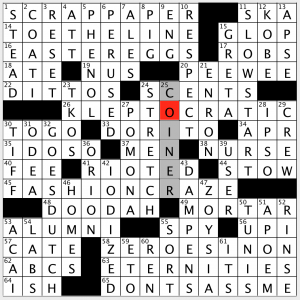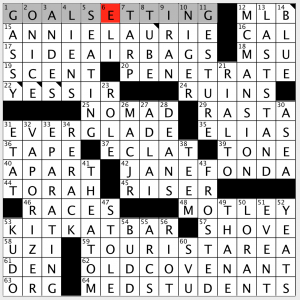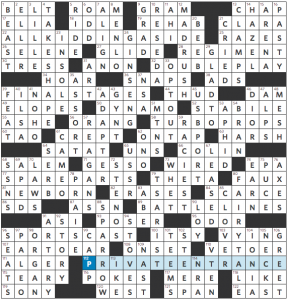 (4.06 avg; 17 ratings) rate it
(4.06 avg; 17 ratings) rate it
 (4.00 avg; 10 ratings) rate it
(4.00 avg; 10 ratings) rate it
 (3.56 avg; 47 ratings) rate it
(3.56 avg; 47 ratings) rate it
 (3.00 avg; 11 ratings) rate it
(3.00 avg; 11 ratings) rate it
Mark Diehl’s New York Times crossword—Amy’s write-up
I solved this one while watching an episode of Silicon Valley and still finished in under 11 minutes, so probably it’s not too hard as Saturday puzzles go. There were two things unknown to me, though:
- 17a. [Corona with tequila and fruit juice, e.g.], BEERGARITA. Why the hell would you wreck a perfectly serviceable margarita by putting lager in it? I resent this puzzle for bringing this abomination to my attention.
- 43a. [Spin like a gyroscope], PRECESS. Straightforward physics sort of word that I don’t think I’ve seen before.
On the zippy side in the fill, we’ve got COFFEEMATE, an ONION BAGEL, TANZANIA, a LOST DOG, RUB RAW, NBA DRAFT, “I’M NO EXPERT,” ZENO’S PARADOX, and MENU PAGES, which is also a website indexing restaurants in eight U.S. cities so it feels more like a “thing” to me and less like a bogus entry.
Five more things:
-
23a. [Big rigs], TANDEMS. No idea if this is about bikes or trucks or something else.
- 37a. [Article of apparel not originating where its name would suggest], PANAMA. As in a Panama hat, which is from Ecuador.
- 39a. [“The Ship” composer, 2016], ENO. As Brian Eno himself says, who cares?
- 46d. [“Hundo”], C-NOTE. Not sure I’ve seen the slang “hundo” make it into a crossword before.
- Lowlights: Crosswordese NEWEL and ONE-A, roll-your-own word HEWER, making me ponder TUNA MELTs.
Four stars from me, over and out.
Claire Muscat’s LA Times crossword – Derek’s write-up
 I didn’t get to meet this budding constructor at the ACPT a couple of weeks ago. I believe her NYT debut was just on 3/29 according to xwordinfo.com. That puzzle was pretty clever, if you haven’t seen it. I won’t spoil it for you here! This is a challenging 72-worder, but only because there are a couple of rare terms in here. I didn’t plow through this ridiculously fast, but tackled it in under 7 minutes. After only solving a couple of her puzzles, I like her style! Keep ’em coming! 4.3 stars for this one today.
I didn’t get to meet this budding constructor at the ACPT a couple of weeks ago. I believe her NYT debut was just on 3/29 according to xwordinfo.com. That puzzle was pretty clever, if you haven’t seen it. I won’t spoil it for you here! This is a challenging 72-worder, but only because there are a couple of rare terms in here. I didn’t plow through this ridiculously fast, but tackled it in under 7 minutes. After only solving a couple of her puzzles, I like her style! Keep ’em coming! 4.3 stars for this one today.
Some points to mention:
-
- 16A [They’re hidden annually] EASTER EGGS – Timely!
- 19A [Xi preceders] NUS – Only question here was whether it was MU or NU. I don’t know the Greek alphabet in order. Primarily because I am not Greek.
- 26A [Ruled by thieves] KLEPTOCRATIC – I had the KLEPTO- part early, and this word makes sense, but still a new one on me. Well done.
- 37A [“It’s Raining __”: The Weather Girls hit] MEN – You know I have to get this tune in your head!
- 48A [“Camptown Races” refrain syllables] DOO DAH – The way this clue is worded, you would think it would be a plural. Tricky!
- 57A [Best Actress between Jennifer and Julianne] CATE – As in Cate Blanchett. Tough clue if you haven’t memorized all of the Oscar winners in order; slightly easier if you at least know WHO has won!
- 12D [Laker great, familiarly] KOBE – You mean it isn’t SHAQ?
- 28D [__ jure: by the law itself] IPSO – This one is also really hard, and harder still if you aren’t a lawyer. IPSO facto is more commonly seen/used.
- 50D [Arab Spring city] TUNIS – After getting a letter or two this one was easy, but I am not familiar with what all this was. I should read this.
- 60D [Han and Leia’s son Kylo __] REN – This was too easy, because who doesn’t know Star Wars? I still have not seen the newest one, though!
See you on Tuesday for another LAT writeup!
Frank Longo’s Newsday crossword, “Saturday Stumper” – Derek’s write-up
 Not as much angst anymore when I see Frank’s byline! OK, maybe a little. His are still some of the toughest of these Stumpers. Depending on the week, though, I suppose they are ALL thorny to some degree. A couple of errors in this one, but all in all I was happy with my effort on this one, and it is one of my better times for a Longo Special. My job is killing me recently with hours, but I find that the puzzles are a major part of what keeps me sane. Maybe it is the quiet needed to concentrate, but I don’t know what I would do if I didn’t do puzzles. Probably chain smoke or binge drink! I will happily call solving my drug. Thanks for the fix, Frank! 4.4 stars today.
Not as much angst anymore when I see Frank’s byline! OK, maybe a little. His are still some of the toughest of these Stumpers. Depending on the week, though, I suppose they are ALL thorny to some degree. A couple of errors in this one, but all in all I was happy with my effort on this one, and it is one of my better times for a Longo Special. My job is killing me recently with hours, but I find that the puzzles are a major part of what keeps me sane. Maybe it is the quiet needed to concentrate, but I don’t know what I would do if I didn’t do puzzles. Probably chain smoke or binge drink! I will happily call solving my drug. Thanks for the fix, Frank! 4.4 stars today.
Some favorites:
-
- 15A [“Bonnie” one of a Scottish song] ANNIE LAURIE – Never heard of this. Almost timely for St. Patty’s day a couple of weeks ago.
- 18A [Where Grisham got his BS degree] MSU – This is Mississippi State, not Michigan State. Times are tough now for Sparty; MSU and Penn State from the Big Ten both now have heavily soiled reputations. I think Michigan State’s is now much worse.
- 31A [Manatee habitat] EVERGLADE – I don’t think I have ever encountered this word in the singular form. It IS an actual environment type!
- 42A [Nancy Reagan in “The Butler” (2013)] JANE FONDA – This is a movie I ACTUALLY SAW! Still don’t remember Hanoi Jane in this. I wonder how long her screen time was? The main character was a butler for several presidents, including Reagan.
- 59A [Much-visited place] TOURIST AREA – I put TOURIST TRAP, because that is where I usually end up!
- 9D [#2 Mideast nation in area] IRAN – Second to Saudi Arabia, no doubt. With a little thought, this actually isn’t that hard, I and I put in IRA? immediately.
- 12D [Kin of a faux château] MCMANSION – Nicely done! Both are terms for gaudy houses.
- 34D [Put back, as weights in a gym] RERACK – I need to go to a gym …
- 52D [“Fiddler of Dooney” poet (1899)] YEATS – I don’t know poetry, but after I had an ending “S”, it was just a question of KEATS or YEATS!
It is still winter here! Have a nice weekend!
Pancho Harrison’s Wall Street Journal crossword, “Chewing the Scenery” — Jim’s review
The Theatah! Pancho Harrison celebrates the stage with phrases whose final word could be re-cast with a theatrical meaning. The first part of the phrase may also change meaning.
- 22a [The mischievous actor winked at the audience and delivered an ___] ALL-KIDDING ASIDE. This one’s pretty wacky. I like it.
- 32a [The actor starred as twins in the ___] DOUBLE PLAY. Double as in doppelgänger.
- 39a [The semiretired actor was appearing on his ___] FINAL STAGES
- 58a [The actors in the fast-moving drama used ___] TURBO PROPS. My favorite entry.
- 77a [The actors with insignificant roles complained about their ___] SPARE PARTS. Not spare as in extra, but spare meaning minimal.
- 89a [The actor in the wartime drama had a lot of ___] BATTLE LINES
- 96a [The actors portraying pro athletes made up the ___] SPORTS CAST
- 112a [The actor portraying a lowly GI made a ___] PRIVATE ENTRANCE
Most of these work well enough, and a couple were chuckle-worthy, so I approve.
Eight theme entries is a fair amount for a 21x grid, but it leaves plenty of room for nice fill. Highlights include: FAIRY TALE, TAKE SHAPE, MAD RUSH, SPARROW, EAR TO EAR, REGIMENT, GINSENG, “GLAD TO,” and DYNAMO.
 Did not know: STABILE (52a, [Alexander Calder creation]). Google tells me a STABILE is “a freestanding abstract sculpture or structure, typically of wire or sheet metal, in the style of a mobile but rigid and stationary.” Oh, I get it. Not a mobile, but a STABILE. The picture shows Calder’s “Flamingo” in Federal Plaza in Chicago.
Did not know: STABILE (52a, [Alexander Calder creation]). Google tells me a STABILE is “a freestanding abstract sculpture or structure, typically of wire or sheet metal, in the style of a mobile but rigid and stationary.” Oh, I get it. Not a mobile, but a STABILE. The picture shows Calder’s “Flamingo” in Federal Plaza in Chicago.
Lowlights: ORANG and SDS and some other standard crosswordese like ELIA, GESSO, UNS, etc.
Most of the clues felt fairly straightforward, but I did like [It comes from the heart]. I knew what it was after immediately, but AORTA didn’t fit. It took a few crossings to get the more general ARTERY. I also liked the pairing of [Setting setting] and [Rising setting] for WEST and EAST respectively.
Overall, a standard, but solid play-on-words theme. I’ll say 3.4 stars.



Found the NYT quizzy and tough. Think I had an easier time with the Stumper which was a good challenge as usual. LAT played too easy.
Yeah, I thought this was one of the toughest NYT Saturdays in a while. It was the perfect kind of hard puzzle, though — every square was ultimately inferrable. So 4.5 stars from me.
The “trivia” was largely the basis for the difficulty imo so I couldn’t rate it so highly.
I found it tough, too, with lots of things I didn’t know, but since those were mostly not proper names, and even one of those was a congresswoman rather than a Harry Potter character, I very much enjoyed it.
Total DNF for me. Died in the NW where I got no foothold at all. I’ve never used COFFEEMATE, wouldn’t buy an ONION BAGEL in a place that doesn’t make bagels, and never heard of a BEERGARITA. So, maybe it’s OK that I couldn’t get these.
Not that it mattered but I thought it was “nouveau riche,” not “nouvelle.” Surely someone who actually knows French can explain why this clue was OK.
I am not a Francophone, but I’m told by family members that “Nouvelle” is the feminine of “Nouveau”, so perhaps “Nouvelle Riche” refers specifically to newly-wealthy women.
An online search for nouvelle riche left me more confused than ever. Some sites actually said there’s no such thing. Most simply cited noveau riche and ignored nouvelle riche. A couple declared there’s no symonym for nouville riche.
It’s true that Nouvelle is the feminine version of Nouveau, and technically you should have the adjective correspond in gender to the noun: Un nouveau manteau, une nouvelle robe… BUT, I think of nouveau riche as a whole expression that hangs together, a state of being, and nouveau becomes adverbial and does not need to be conjugated. So, most commonly you leave it alone. But making it correspond to the noun is allowed.
The best I could find as a link is using nouveau né (new born) as a case in point… you can see that this expression typically leaves nouveau as is and only modifies the née, adding the e at the end… https://fr.m.wiktionary.org/wiki/nouveau-née
So, as I was solving I found it unnecessarily misleading, I guess trying to make it tougher but winding up being somewhat off…
That threw me, too. I started with Nouvelle ANNEE.
yep, was very unsure about RICHE
In the “Hmmm…I learned something today” category, I always thought “peruse” referred to idle skimming, not careful reading. My wife, with whom I did the puzzle, had the same misunderstanding.
The LAT refers to “Going Dutch”, which I thought would warrant a comment in this blog, as it was originally (and in some circles) a derogatory reference to the stinginess of the Dutch. I think this is a great example of how we can get over ourselves and realize that, just because a word may originally have meant one thing, it can become a benign colloquialism devoid of its original malice. Are any of Dutch origin offended by this?
When I was a cub scout back in the 1960’s, I came home from a meeting very excited to ask my parents if I could go on my first overnight camping trip. They were just finishing dinner, and discovered the peppercorns I had mischievously put in the Coffee Mate earlier that day, putting my wilderness experience at great risk. (I did receive some sort of punishment but I was allowed to go camping, thanks to my parents’ ability to put things in perspective).
DH,
I am not sure from your post whether you thought PERUSE only means idly skim. It is one of my pet peeve words because it means both idly skim and thoroughly examine. How can you possibly use this word in a sentence and not be ambiguous?
I began to develop this pet peeve many years ago when someone used the word TRUCULENT, which I thought meant (exclusively) savage. He meant FEISTY, which I guess is an acceptable synonym today, but certainly not the equivalent of savage.
Very hard puzzle for me today. When I got the H in RICHE, the puzzle started to fall, but I also thought that it was only NOUVEAU.
Steve
I thought “peruse” had a single meaning, which was “idly skim”. I have the same issue with the word “siege”, which was commented on in this blog not to long ago. “Siege” means both “to wait out” and “to charge”; impossible to tell which even from contextual clues. In fact, you can end a siege by initiating a siege, if that makes any sense.
Steve, your reference to TRUCULENT reminded me of Al Michaels’ story about Bob Uecker and Howard Cosell “discussing” the meaning of that word. Here’s a link to Michaels recounting the story:
https://www.youtube.com/watch?v=EMnr3PeVsgE (44 sec., no ads)
DH, I cringed at the “going Dutch” entry. Now I’m cringing again at the suggestion that we “get over ourselves” by ignoring bigoted language.
I’m not suggesting that we ignore it as much as I’m suggesting that we refuse to allow it to affect us. In this way, those who use it derogatorily will just be seen as ignorant, and we will rise above. I think that “Going Dutch” is an example of a phrase that has evolved; only a small number of us know of its derogatory origins. I don’t know of anyone who is actually offended by a “Dutch Treat”; it seems to have just come to mean “Let’s split the bill”. I think it’s nice that we, as a race of humans, have been able to effectively change the meaning of a word in our own language, just by using it nicely.
Thank you, DH. Just thank you.
I know a few Dutch folks, including a close uncle, and they have absolutely no problem with the expression, “going Dutch.” Unsurprisingly, Americans are the ones offended on everyone else’s behalf. This phenomenon is what I find offensive – Americans who desperately crave the “gotchas” found in in every nook and cranny of our lives. Talk about cultural appropriation…these Americans are slowing us down by sticking their political correctness in others faces.
Wtf “peruse” can mean “pay attention to attentively”. I had no idea. Blows my mind.
I thought PERUSE means only casual reading, too. MW11C gives pretty much equal weight to both meanings, while RHUD prefers careful study.
Tough Saturday. A lot of proper names, some of which helped, some of which were unknown to me. Never heard of BEERGARITA or “Hundo” or TETANY. Wanted BALOO before COBRA, VAGUE before RICHE.
I too don’t understand TANDEMS as “big rigs.” Does it refer to monster semis that have two trailers hitched behind the cab? I think they refer to them as ‘road trains’ in Australia.
I didn’t care for the PRECESS clue. A gyroscope spins about its axis; precession is the much slower rotation of the axis about the vertical.
Yes, based on your description, I believe that tandems and road trains are the same thing.
https://goo.gl/images/zmuc4Q
It’s a full trailer (with front and back wheels) attached to a semi trailer (with back wheels only). Banned on some highways in the US.
While I had to look up TANDEMS to confirm, seems fine with me. I don’t mind PRECESS either, since “spin” and “rotate” are synonyms. That is, a gyroscope rotates rapidly around its axis and more slowly around the vertical.
I was just now able to get to the posts from yesterday, which prompted this question: Is bitching the feminine counterpart to mansplaining?
If you’re trying to piss off every woman (and feminist man, and feminist nonbinary person) who reads this, sure.
Actually, Amy, I’m pissed off at the term “mansplaining” and the way it’s used on this on this blog. I’m more often in agreement with the feminine viewpoints expressed in these pages but it seems to me that complaining about mansplaining is no different than bitching about ladysplaining. It certainly is a gender specific term. Don’t we all do it to some degree?
You’re missing the point. When we live in a society where women’s viewpoints are given more credence than men’s—in politics, in the workplace, everywhere—then you can start whining about the problem of “womansplaining.” Until then, though, stand down.
If you’ve not read the original essay on mansplaining, here it is:
https://www.guernicamag.com/rebecca-solnit-men-explain-things-to-me/
John, you’re welcome to speak directly to me if you’d like to. If you’re not going to do that, please don’t use misogynistic dehumanizing terms to refer to what I write.
And no, “bitching” and “mansplaining” are not the same thing, for the reasons Amy explains above. You spend nearly sixty years having your intelligence and expertise routinely dismissed and see how you like it.
Yes, there’s no female equivalent for mansplain. It doesn’t happen often enough, sadly.
A garage door spring broke today, and it took 15 minutes of careful maneuvering to get the car out another door. It was quite a bitch. That usage, as well as bitching about something, has no feminine implication as far as I can see. Things that are a bitch to accomplish are things and men seem to bitch about situations more than women. I have no idea what the origins of these senses are. I can’t imagine what the base “bitch” is supposed to be. A “son of a bitch” is invariably a man, and it implies his ancestry is canine. “Bitch” was, originally, no more pejorative (or sexist) than “hen” or “mare.” Calling a woman a bitch is clearly both pejorative and sexist (it’s calling her a dog) but it’s not clear to me that “bitching” is inherently sexist in origin. But I would avoid any sense except the clearly canine one since the sexist sense will be invoked for the hearer.
But it’s never occurred to me that bitching is something that women do more than men, so any comparison with mansplaining isn’t even wrong.
To Derek:
“Dooney” (an Irish name) + “poem” combined was “supposed” to indicate “Irish poet” (which is usually YEATS, and KEATS was not), and the year (1899) would’ve eliminated Keats if one knew that KEATS left us in the early 19th century (along with his contemporaries Shelley and Byron).
I’ve started adding years fairly regularly to Newsday puzzle clues, even Stumpers, to give some chronological help where the clue wouldn’t otherwise provide it. That’s why there was a year at the end of the JANE FONDA clue.
Mr. Newman, could you explain how GO QUIETLY works for “Cross the threshold without knocking?”?
Thank you
WSJ: nit on 1down. “Belle’s love” is BÊTE, not BEAST. BEAST is Beauty’s love. Mixing languages.
But in the movie, the female character’s name is Belle.
Ok, Amy. I have only seen the French film.
The history of the term “mansplaining” is interesting to me. Even Solnit has expressed frustration in how the term’s application has strayed from her original intent. She was mainly framing the term in a professional context – she had been discussing the biography she had just written at a cocktail party, where a male party guest interrupted her to inform her about a new book on that same historical subject (it was her book that he was referring to). Mansplaining was a specific slight that assumed a woman wouldn’t have as much expertise in their field than their male counterparts.
Since then, however, it seems to have morphed to describe general male-to-female condescension, and now I find it frequently serves as a means to shut down dialogue. When a man offers up an opinion that differs from a female’s opinion, it’s now routine to dismiss the differing opinion as “mansplaining,” no matter how cogent the argument be (for the record, I don’t feel Papa John’s comment above is particularly, um, cogent).
As a gay male, I have similar reservations about the term “straightsplaining,” which again I see used more as a preemptive strike than a particularly effective rhetorical device. I prefer to live in a society, not a tribe; a defining element of that society being diversity, and a defining element of that diversity being diversity of opinion. We need to have conversations about these inequities (because these inequities are real, and not imagined) that are grounded in a spirit of coexistence, not in a spirit of oneupmanship that I feel is too dominant in the discourse currently.
I see a lot of extreme views posted on this site, from both sides of the spectrum. I know – it’s the internet, and mild takes don’t have much currency online. I’d just like to remind folks of the large swath of middle ground that seems to be mostly ignored when these discussions arise.
LAT 45 A Anyone else try “fashion crime” instead of “fashion craze” first?